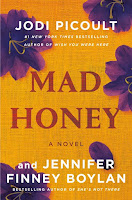Author: Jodi Picoult and Jennifer Finney Boylan
Publication Information: Ballantine Books. 2022. 464 pages.
ISBN: 1984818384 / 978-1984818386
Rating: ★★
Book Source: I received this book through Jodi Picoult free of cost in exchange for an honest review.
Opening Sentence: "From the moment I knew I was having a baby, I wanted it to be a girl."
Favorite Quote: "People always talk about how their love for you is unconditional. Then you reveal your most private self to them, and you find out how many conditions there are in unconditional love."
The author's note states the goal and the reason I read Jodi Picoult's books. "In so many ways my entire career has been about untangling the knots that society tangles itself in as we futilely attempt to separate the us from the them." Further, it states the unstated lesson of the book. "What would I like you to take away from this novel. Absolutely nothing. I'd like you to give - a change, a thought, a damn. Like ......, difference is a construct. We are all flawed, complicated, wounded dreamers we have more in common with one another than we don't. Sometimes making the world a better place just involves creating space for the people who are already in it."
Two important points that I find run through all of Jodi Picoult's books. Her books always make me think and make me question. Some stories I have enjoyed more than others, but all have left me thinking.
That being said, this is a challenging book to review because the topic at the heart of it is itself part of the reveal of the book's mystery. Prior to this book, I was not very familiar with Jennifer Finney Boylan. Had I been, I might have guessed at the book's mystery before I read it. Her author's note states, "All of us have something in our hearts like a flower that cannot bloom because it is held in secret. The adventure of life can be to get that thing out of the darkness where it lies and let the sun shine on it. So it can go back inside your heart facing the right direction."
This book will elicit strong emotions because of the topic, the age of the individuals, and the fact that the topic is not clear from the description. However, this review is of the characters, the story, and how it's told.
The book has a small cast of central characters. Ava and Lily. Olivia and Asher. Maya. Olivia's family. Asher's father. The small town that Lily and Asher call home. In addition to the main topic of the book, this story delves into abuse, abortion, teenage romance and rivalries, teenage sex, the role of women in society, and beekeeping.
I find the beekeeping information interesting. "Mad honey comes from bees that forage on rhododendron and mountain laurel, and it's full of poisonous grayanotoxins. It causes dizziness, nausea and vomiting, convulsions, cardiac disorders, and more. Symptoms last for twenty-four hours, and although rarely, if left untreated, can be fatal. It has been used in biological warfare as far back as 399 BC ... The secret weapon of mad honey, of course, is that you expect it to be sweet, not deadly. You're deliberately attracted to it. By the it messes with your head, with your heart, it's too late." I am guessing there is a metaphor to be found in that title and that progression. However, it was a lot of information about beekeeping.
The book also goes into multiple timelines to capture all these issues - Lily as a child, Olivia's marriage and divorce, the days and months after Lily's death, and the days and weeks leading up to Lily's death. Are all necessary? To me, no. Do they get confusing? Sometimes, if I fail to read and refer to the chapter headings
Ultimately, it is the teenage issues that become the solution to the mystery. This is not really a surprise or a spoiler given the small cast of characters and the clear path of the investigation as to who is considered and who is not. That is disappointing as the intensity of the book and the education presented about the central issues of the book is lacking in that solution. That is also disappointing as the conversation seems unfinished and the age of the characters overshadows the more important issues at hand.
The book leaves me sad and disappointed. Although the telling of this story was not for me, I am still left thinking and still look forward to the next book by Jodi Picoult.
Please share your thoughts and leave a comment. I would love to "talk" to you.







